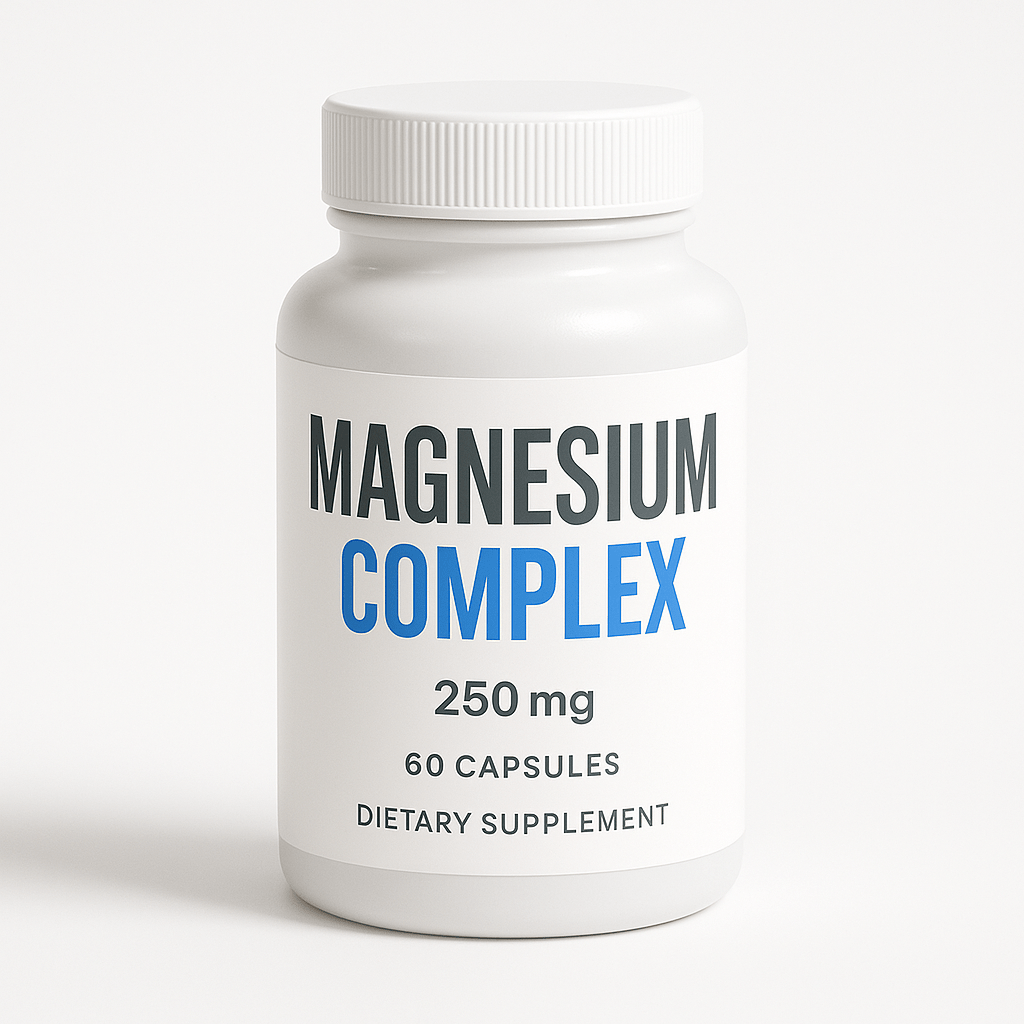Magnesium is one of the most important trace elements for the human body, participating in more than 300 biochemical reactions. Despite its importance, many people do not get enough magnesium from their diet alone. This is where a magnesium complex comes to the rescue – a dietary supplement that combines several forms of magnesium and is often supplemented with other beneficial substances that improve its absorption and effectiveness. Unlike single-form magnesium supplements, the complex provides a wider range of effects and helps to more effectively solve the problems of magnesium deficiency.
In this article, we will discuss in detail what a magnesium complex is, what health benefits it provides, how to recognize the signs of magnesium deficiency, how to choose the most suitable supplement and how to use it safely.
What is a magnesium complex and why is it important?
A magnesium complex is a supplement that contains several different forms of magnesium combined into one product.

Unlike conventional magnesium supplements, which typically use a single form of magnesium (such as magnesium citrate or magnesium oxide), a complex combines multiple forms, improving absorption and providing a more comprehensive benefit to the body.
Different forms of magnesium have different properties – some are better absorbed, others are more effective for certain body functions. For example, magnesium citrate is great for the digestive system, magnesium glycinate helps the nervous system and sleep, and magnesium malate is beneficial for muscle function and energy production. This is why a complex supplement provides a wider range of benefits.
The popularity of magnesium complexes is growing for several reasons:
- increased bioavailability – different forms of magnesium in the complex ensure better absorption
- more comprehensive effect – the complex serves various body systems
- better tolerance – some forms of magnesium can cause digestive disorders, but the different forms in the complex help to reduce this effect
- additional beneficial components – magnesium complexes are often supplemented with vitamins B6, D3, zinc and other substances that enhance the action of magnesium
Magnesium forms and their properties
The following forms are most often used in magnesium complexes:
- Magnesium citrate – one of the best absorbed forms, effective in softening stools and reducing muscle tension
- Magnesium glycinate – an extremely well absorbed and well tolerated form, especially beneficial for the nervous system and sleep
- Magnesium malate – helps fight fatigue, improves energy production, useful for people with chronic fatigue
- Magnesium taurate – beneficial for the cardiovascular system
- Magnesium oxide – a less absorbed form, but has the highest magnesium content, effective in solving heartburn problems
- Magnesium chloride – great for digestion and detoxification
The best magnesium complex usually combines several of these forms, ensuring a wide range of effects and good absorption. When looking for a quality magnesium complex, it is worth paying attention to the combinations of these forms, as they complement each other and enhance the overall effectiveness of the supplement.
Benefits of a magnesium complex: why is it worth taking it?
Magnesium helps reduce tiredness and fatigue
Magnesium is involved in energy production processes and helps the body fight physical and mental exhaustion more effectively. This is especially important for people who feel a lack of energy, work intensively or do sports.

Magnesium helps maintain normal energy metabolism
Magnesium is required for enzymes responsible for releasing energy from nutrients. It helps cells efficiently use energy from carbohydrates, proteins and fats.
Magnesium helps maintain normal nervous system function
This mineral is important for transmitting nerve impulses between cells. It maintains proper balance in the nervous system, which can help maintain calm, concentration and resistance to stress.
Magnesium helps maintain normal muscle function
Magnesium is needed for both muscle contraction and relaxation. Sufficient amounts of it help prevent cramps and support muscle coordination and recovery after exercise.
Magnesium helps maintain normal psychological function
Magnesium supports brain function, is involved in the activity of neurotransmitters and can help maintain emotional stability, concentration and good mood.

Magnesium helps maintain normal bone and tooth condition
Magnesium is important for bone structure – it supports calcium absorption and integration into bone tissue. It also contributes to maintaining strong teeth.
Magnesium plays a certain role in the process of cell division
Magnesium is important for cell renewal and normal reproduction – this is especially important for growth, tissue repair and overall health of the body.
Signs of magnesium deficiency and who needs a magnesium complex
Magnesium deficiency is a fairly common problem in the modern world. Due to soil depletion, consumption of processed foods and stress, many people do not get enough magnesium. It is important to recognize the symptoms of magnesium deficiency and understand which groups of people are particularly recommended to take a magnesium complex.
Common signs of magnesium deficiency
- Muscle cramps and spasms – especially in the legs and feet, often occurring at night
- Constant fatigue and lack of energy – even after a good night’s sleep
- Anxiety, irritability and mood swings – magnesium is needed for neurotransmitter balance
- Insomnia and sleep disorders – difficulty falling asleep or staying asleep throughout the night
- Headaches and migraines – often associated with vascular dysfunction
- Heart rhythm disorders – irregular heartbeat, “palpitations”
- Increased sensitivity to noise – increased irritability to sounds
- Digestive problems – constipation, bloating
- Frequent infections – weakened immune system
- High blood pressure – magnesium deficiency can lead to narrowing of blood vessels
Groups of people who are especially recommended to take a magnesium complex
Athletes and active people – during intense physical activity, magnesium is lost through sweat. During training, the need for magnesium for muscle work also increases. A magnesium complex can help reduce muscle pain, speed up recovery and improve overall physical performance.
People experiencing high stress – stress increases the excretion of magnesium from the body. At the same time, stress increases the need for magnesium in the nervous system. This vicious circle can quickly lead to magnesium deficiency. A magnesium complex can help break this cycle and improve the body’s resistance to stress.
Older people – with age, the efficiency of magnesium absorption decreases and its excretion through the kidneys increases. For older people, a magnesium complex can be especially useful for strengthening bones, supporting the cardiovascular system and preserving muscle mass.
Pregnant and lactating women – during pregnancy, the need for magnesium increases significantly, as it is necessary for the development of both the mother and the fetus. Magnesium complex can help reduce the risk of pregnancy complications, such as premature birth or gestational hypertension.
People with chronic diseases – diabetes, cardiovascular disease, migraine, fibromyalgia, Alzheimer’s disease and other chronic conditions are often associated with magnesium deficiency. Magnesium complexes can be a useful additional tool in treating these diseases and improving quality of life.
People taking certain medications – diuretics, antibiotics, anticancer drugs and some other drugs can reduce magnesium levels in the body. Magnesium complex can help compensate for this effect.
People who drink alcohol – alcohol increases magnesium excretion in the urine and reduces its absorption. People who regularly drink alcohol often have magnesium deficiency.
Vegetarians and vegans – although plant-based diets contain magnesium sources, plant products also contain phytates and oxalates, which can inhibit magnesium absorption. Magnesium complex can ensure sufficient magnesium levels.
If you notice several signs of magnesium deficiency or belong to a risk group, it is worth considering taking a magnesium complex. However, it is recommended to consult a doctor before starting to use it, especially if you have chronic diseases or are taking medications.
How to Choose the Best Magnesium Complex – Forms, Dosages, and Product Quality
The magnesium supplement market is vast and diverse, so choosing the most suitable magnesium complex can be difficult. Here are some important factors to consider when choosing a magnesium complex.
Magnesium Forms and Their Suitability
When choosing a magnesium complex, pay attention to the forms of magnesium it contains and their suitability for your needs:
- Magnesium citrate – a good choice for those starting to take magnesium supplements, suitable for digestive problems and general magnesium deficiency
- Magnesium glycinate – a great choice for sleep problems, anxiety, and stress reduction
- Magnesium malate – the best choice for lack of energy and chronic fatigue
- Magnesium taurate – ideal for the cardiovascular system
- Magnesium threonate – the newest form that best penetrates the brain, therefore suitable for improving cognitive functions
A quality magnesium complex should contain at least 2-3 different forms of magnesium, ensuring a wide range of effects.

Avoid products that contain only magnesium oxide, as this form is the least absorbable.
Dosage and bioavailability
The recommended daily intake of magnesium for adults is:
- Men: 400-420 mg per day
- Women: 310-320 mg per day
- Pregnant women: 350-360 mg per day
When choosing a magnesium complex, pay attention to the amount of elemental magnesium (not the total weight of the magnesium compound). For example, 1000 mg of magnesium citrate only contains about 120 mg of elemental magnesium.
Bioavailability is the portion of magnesium that the body can absorb and use. Different forms of magnesium have different bioavailability:
- Magnesium citrate, glycinate, malate, taurate: 30-40% absorption efficiency
- Magnesium oxide: only 4-5% absorption efficiency
Therefore, when choosing a product, it is important to consider not only the total amount of magnesium, but also its form.
Additional beneficial substances in the complex
The best magnesium complex is often supplemented with other beneficial substances that improve the absorption of magnesium and enhance its effect:
- Vitamin B6 – helps transport magnesium into cells
- Vitamin D – improves the absorption of magnesium and strengthens bones together with it
- Vitamin K2 – works synergistically with magnesium and vitamin D for bone health
- Zinc – strengthens the immune system together with magnesium
- Calcium – supports bone and muscle health together with magnesium
- Resveratrol – a strong antioxidant that, together with magnesium, improves the cardiovascular system
When choosing a magnesium complex with additional substances, it is important to evaluate their quality and quantity to ensure optimal synergistic effect.
Product Quality and Manufacturer Reliability
When choosing a magnesium complex, pay attention to the following quality indicators:
- Third-party certification – quality supplements often have independent laboratory approvals
- GMO-free – it is worth choosing products without genetically modified organisms
- Additive-free – fewer artificial colors, preservatives and fillers
- Allergen-free – quality products are often free of gluten, lactose, soy and other common allergens
- Manufacturer reputation – trust manufacturers with many years of experience and good reviews
- Transparency – the manufacturer clearly indicates all ingredients and their origin
The cheapest products often use the least absorbable forms of magnesium and may contain a lot of fillers, so it is worth investing in a quality magnesium complex.
Magnesium Complex Form
Magnesium complexes come in a variety of forms, each with its own benefits:
- Tablets and capsules – the most convenient and popular option
- Powder – may be better absorbed, easier to adjust to individual doses
- Liquid forms – the easiest to absorb, but often have a shorter shelf life
- Transdermal products (oils, lotions) – useful for those with digestive problems
When choosing a form, it is important to consider your lifestyle and needs. For example, capsules are the most convenient when traveling, while powder or liquid forms are better suited for those who have difficulty swallowing pills.
Safety, Potential Side Effects, and Best Practices
While magnesium complexes are safe for most people, it is important to be aware of potential side effects and follow proper usage guidelines to avoid problems.
Safe Doses and Overdose Risks
The European Food Safety Authority (EFSA) has established the following safe doses for magnesium supplements:
- Up to 350 mg of additional magnesium per day for adults (in addition to what is obtained from food)
The risk of overdose from consuming magnesium from food is virtually non-existent, as excess magnesium is effectively eliminated by healthy kidneys. However, the following overdose symptoms may occur when taking large amounts of magnesium supplements:
- Diarrhea
- Abdominal pain and cramps
- Nausea and vomiting
- Lethargy and weakness
- In severe cases, breathing difficulties, heart rhythm disturbances, hypotension
People with kidney failure should only take magnesium supplements under medical supervision, as they cannot effectively remove excess magnesium from the body.
Common Side Effects
Even when taking the recommended doses of magnesium complex, some people may experience the following side effects:
- Digestive problems – diarrhea, bloating, or discomfort, especially when taking magnesium citrate or oxide
- Allergic reactions – in rare cases, allergic reactions to additional ingredients in supplements can occur
- Fatigue or drowsiness – because magnesium has a sedative effect, some people may experience increased drowsiness
Many side effects can be avoided by starting with lower doses and gradually increasing them, as well as by taking the magnesium complex with food.
Interactions with drugs and other supplements
Magnesium complexes may interact with some drugs:
- Antibiotics – magnesium may reduce the absorption of tetracycline and quinolone antibiotics. It is recommended to take 2-3 hours between taking these drugs.
- Blood pressure medications – magnesium may enhance the effect of some blood pressure medications
- Muscle relaxants – magnesium may enhance their effect
- Diuretics – different diuretics can either increase the excretion of magnesium or increase its concentration in the blood
- Osteoporosis medications – magnesium may reduce the absorption of bisphosphonates
Regarding interactions with other supplements, magnesium may interact with:
- Calcium – high doses of calcium may compete with magnesium for absorption
- Zinc – high doses of both minerals may reduce the absorption of each other
- Iron – magnesium may reduce the absorption of iron
To avoid interactions, it is recommended to take at least 2 hours between taking these supplements.
Best practices
To get the most out of your magnesium complex and minimize side effects, it is recommended to:
- Take with food – this reduces the risk of digestive upset
- Split the dose – instead of one large dose, it is better to take smaller doses throughout the day
- Take in the evening – due to its calming effect, magnesium complexes are best taken in the evening, especially if you have sleep problems
- Start with a lower dose and gradually increase it so that the body gets used to it
- Take regularly – the benefits of magnesium appear when you take it regularly over a longer period of time
- Monitor the reaction – pay attention to your body’s reaction and adjust the dose if necessary
- Consult your doctor – especially if you have chronic diseases or are taking medications
By choosing the right magnesium complex and following these recommendations, you can safely enjoy the full health benefits of magnesium.
Conclusions
Magnesium complex is a valuable supplement that can help many people improve their health and quality of life. Unlike a single form of magnesium supplement, a complex provides a wider range of benefits and better absorption, which leads to a more effective solution to magnesium deficiency.
When choosing a magnesium complex, it is important to pay attention to the forms of magnesium it contains, additional beneficial substances, the reliability of the manufacturer and the quality of the product. It is recommended to consult a healthcare professional before starting to take magnesium supplements, especially if you have chronic diseases or are taking medications.
Regular use of a quality magnesium complex can help reduce fatigue, improve sleep, strengthen the nervous system, support muscle and heart function, and increase the body’s overall resistance to stress. However, it is important to remember that supplements are not the solution to all health problems – they should be part of a healthy diet, physical activity and lifestyle.
Listen to your body, monitor its reaction to taking a magnesium complex and, if necessary, adjust the dose or form. Magnesium balance in the body is an important aspect of health that is worth paying attention to in this busy modern world.
Frequently Asked Questions (FAQ)
What is a magnesium complex and how is it different from regular magnesium supplements?
A magnesium complex is a supplement that contains several different forms of magnesium combined into one product, rather than a single form like regular supplements. The combination of different forms ensures better absorption and a wider range of effects.
What are the main benefits of a magnesium complex?
The main benefits include reducing fatigue, improving muscle and nervous system function, better sleep, strengthening bones and reducing stress.
Who is recommended to take a magnesium complex?
Magnesium complex is recommended for athletes, people under high stress, the elderly, pregnant women and those suffering from magnesium deficiency symptoms such as muscle cramps, insomnia or fatigue.
Do magnesium complexes have side effects?
When taken at recommended doses, magnesium complexes are generally well tolerated, but may cause digestive upset such as diarrhea or abdominal discomfort in some people, especially when taken in high doses.

